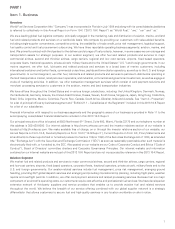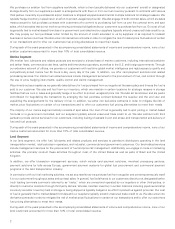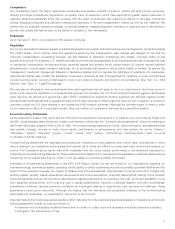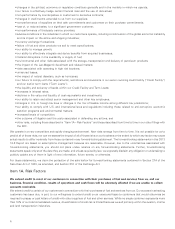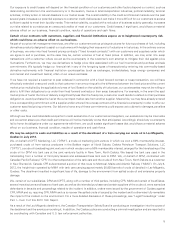World Fuel Services 2013 Annual Report Download - page 17
Download and view the complete annual report
Please find page 17 of the 2013 World Fuel Services annual report below. You can navigate through the pages in the report by either clicking on the pages listed below, or by using the keyword search tool below to find specific information within the annual report.On December 8, 2009, we received an administrative subpoena from OFAC requesting information regarding our transactions
involving Sudanese overflight payments since June 30, 2008. We responded to the subpoena and identified a small number of
sanctioned country-related transactions which took place after our license had expired that may have resulted in violations of
U.S. sanctions regulations or our OFAC-issued license. In our response to OFAC, we noted that the transactions we identified as
potential violations resulted in very small amounts of revenue to us. We have also taken various remedial actions to further strengthen
our compliance related policies and procedures. Nevertheless, should OFAC determine that these activities constituted violations of
U.S. sanctions regulations, civil penalties, including fines, could be assessed against us. Additionally, in the course of its ongoing
review, OFAC could request additional information from us, in the form of additional subpoenas or otherwise, and we intend to fully
cooperate with any such additional subpoenas or requests. We cannot predict the ultimate outcome of the OFAC review, the total
costs to be incurred in response to this review, the potential impact on our personnel, the effect of implementing any further measures
that may be necessary to ensure full compliance with U.S. sanctions regulations or to what extent, if at all, we could be subject to
fines, sanctions or other penalties.
If we are unable to retain our senior management and key employees, our business and results of operations could be
harmed.
Our ability to maintain our competitive position is largely dependent on the services of our senior management and key personnel.
Although we have employment agreements with certain of our key executive officers, the employment agreements do not prevent
those officers from ceasing their employment with us at any time. If we are unable to retain existing senior management and key
personnel, or to attract other qualified senior management and key personnel on terms satisfactory to us, our business will be
adversely affected. While we maintain key man life insurance with respect to certain members of senior management, our coverage
levels may not be sufficient to offset any losses we may incur and there is no assurance that we will continue to maintain key man life
insurance in the future.
Our failure to comply with the requirements of our Credit Facility and Term Loans could adversely affect our operating
flexibility.
We have the ability to borrow money pursuant to a Credit Facility and Term Loans that impose certain operating and financial covenants
on us, such as limiting or prohibiting our ability to (i) pay dividends, (ii) incur additional debt, (iii) create liens, (iv) make restricted
payments, (v) sell assets and (vi) engage in mergers or acquisitions. Our failure to comply with the requirements of these facilities,
including meeting certain financial ratios, could result in an event of default. An event of default, if not cured or waived, would permit
acceleration of any outstanding indebtedness under these facilities, could trigger cross-defaults under other agreements to which we
are a party, such as certain derivative contracts and promissory notes issued in connection with acquisitions, and would impair our
ability to obtain working capital advances and letters of credit, any of which could have a material adverse effect on our business,
financial condition, results of operations and cash flows.
Our operations may be adversely affected by legislation as well as competition from other energy sources and new or
advanced technology.
Fuel competes with other sources of energy, some of which are less costly on an equivalent energy basis. There are significant
governmental incentives and consumer pressures to increase the use of alternative fuels in the United States. A number of
automotive, industrial and power generation manufacturers are developing more fuel efficient engines, hybrid engines and alternative
clean power systems using fuel cells or clean burning gaseous fuels. The more successful these alternatives become as a result of
governmental incentives or regulations, technological advances, consumer demand, improved pricing or otherwise, the greater the
potential negative impact on pricing and demand for our products and services and accordingly, our profitability.
In addition, federal, state and/or foreign governments may enact legislation or regulations that attempt to control or limit GHGs such as
carbon dioxide. Such laws or regulations could impose costs tied to carbon emissions, operational requirements or restrictions, or
additional charges to fund energy efficiency activities. They could also provide a cost advantage to alternative energy sources, result in
other costs or requirements, such as costs associated with the adoption of new infrastructure and technology to respond to new
mandates, or impose costs or restrictions on end users of fuel. For example, some of our customers in the transportation industry may
be required to purchase allowances or offsets or incur other costs to comply with existing or future requirements relating to GHG.
Finally, the focus on climate change could also negatively impact the reputation of fuel products or services such as those we offer.
The occurrence of the foregoing events could put upward pressure on the cost of fuel relative to other energy sources, increase our
costs and the prices we charge to customers, reduce the demand for our products, and therefore adversely affect our business,
financial condition, results of operations and cash flows.
Third parties who fail to provide services to us or our customers as agreed could harm our business.
We use third parties to provide various services to our customers, including into-plane fueling at airports, fueling of vessels in port and
at sea and delivering land-based fuel. The failure of these third parties to perform these services in accordance with contractual terms
for any reason, such as an interruption of their business because of weather, environmental or labor difficulties or political unrest, could
affect our relationships with our customers and subject us to claims and other liabilities that could have a material adverse effect on our
business, financial condition, results of operations and cash flows.
11


